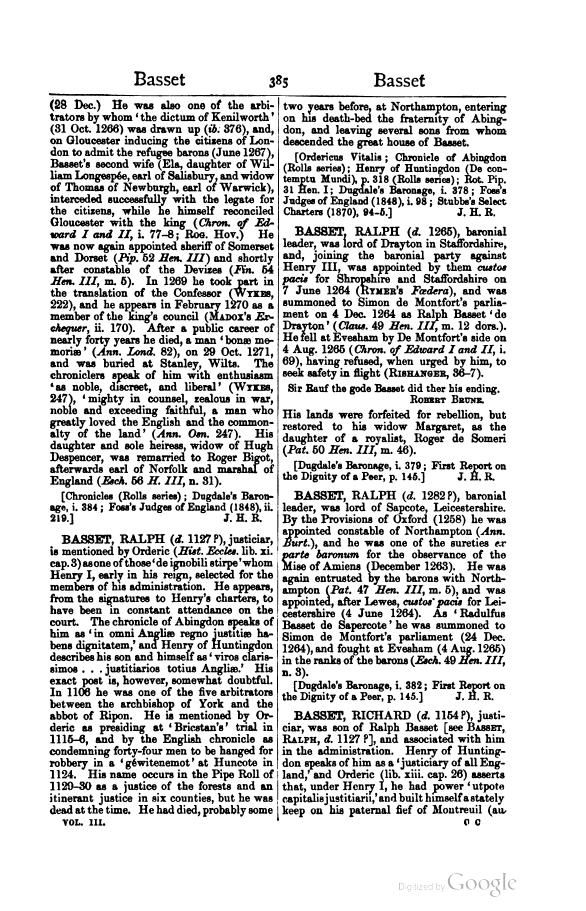(28 Dec.) He was also one of the arbitrators by whom ‘the dictum of Kenilworth’ (31 Oct. 1266) was drawn up (ib. 376), and, on Gloucester inducing the citizens of London to admit the refugee barons (June 1267), Basset's second wife (Ela, daughter of William Longespée, earl of Salisbury, and widow of Thomas of Newburgh, earl of Warwick), interceded successfully with the legate for the citizens, while he himself reconciled Gloucester with the king (Chron. of Edward I and II, i. 77–8; Rog. Hov.) He was now again appointed sheriff of Somerset and Dorset (Pip. 52 Hen. III) and shortly after constable of the Devizes (Fin. 54 Hen. III, m. 5). In 1269 he took part in the translation of the Confessor (Wykes, 222), and he appears in February 1270 as a member of the king's council (Madox's Exchequer, ii. 170). After a public career of nearly forty years he died, a man ‘bonæ memoriæ’ (Ann. Lond. 82), on 29 Oct. 1271, and was buried at Stanley, Wilts. The chroniclers speak of him with enthusiasm ‘as noble, discreet, and liberal’ (Wykes, 247), ‘mighty in counsel, zealous in war, noble and exceeding faithful, a man who greatly loved the English and the commonalty of the land’ (Ann. Osn. 247). His daughter and sole heiress, widow of Hugh Despencer, was remarried to Roger Bigot, afterwards earl of Norfolk and marshal of England (Esch. 56 H. III, n. 31).
[Chronicles (Rolls series); Dugdale's Baronage, i. 384; Foss's Judges of England (1848), ii. 219.]
BASSET, RALPH (d. 1127?), justiciar, is mentioned by Orderic (Hist. Eccles. lib. xi. cap. 3) as one of those ‘de ignobili stirpe’ whom Henry I, early in his reign, selected for the members of his administration. He appears, from the signatures to Henry's charters, to have been in constant attendance on the court. The chronicle of Abingdon speaks of him as ‘in omni Angliæ regno justitiæ habens dignitatem,’ and Henry of Huntingdon describes his son and himself as ‘viros clarissimos … justitiarios totius Angliæ.’ His exact post is, however, somewhat doubtful. In 1106 he was one of the five arbitrators between the archbishop of York and the abbot of Ripon. He is mentioned by Orderic as presiding at ‘Bricstan's’ trial in 1115–6, and by the English chronicle as condemning forty-four men to be hanged for robbery in a ‘géwitenemot’ at Huncote in 1124. His name occurs in the Pipe Roll of 1129–30 as a justice of the forests and an itinerant justice in six counties, but he was dead at the time. He had died, probably some two years before, at Northampton, entering on his death-bed the fraternity of Abingdon, and leaving several sons from whom descended the great house of Basset.
[Ordericus Vitalis; Chronicle of Abingdon (Rolls series); Henry of Huntingdon (De contemptu Mundi), p. 318 (Rolls series); Rot. Pip. 31 Hen. I; Dugdale's Baronage, i. 378; Foss's Judges of England (1848), i. 98; Stubbs's Select Charters (1870), 94–5.]
BASSET, RALPH (d. 1265), baronial leader, was lord of Drayton in Staffordshire, and, joining the baronial party against Henry III, was appointed by them custos pacis for Shropshire and Staffordshire on 7 June 1264 (Rymer's Fœdera), and was summoned to Simon de Montfort's parliament on 4 Dec. 1264 as Ralph Basset ‘de Drayton’ (Claus. 49 Hen. III, m. 12 dors.). He fell at Evesham by De Montfort's side on 4 Aug. 1265 (Chron. of Edward I and II, i. 69), having refused, when urged by him, to seek safety in flight (Rishanger, 36–7).
Sir Rauf the gode Basset did ther his ending.
Robert Brune.
His lands were forfeited for rebellion, but restored to his widow Margaret, as the daughter of a royalist, Roger de Someri (Pat. 50 Hen. III, m. 46).
[Dugdale's Baronage, i. 379; First Report on the Dignity of a Peer, p. 145.]
BASSET, RALPH (d. 1282?), baronial leader, was lord of Sapcote, Leicestershire. By the Provisions of Oxford (1258) he was appointed constable of Northampton (Ann. Burt.), and he was one of the sureties ex parte baronum for the observance of the Mise of Amiens (December 1263). He was again entrusted by the barons with Northampton (Pat. 47 Hen. III, m. 5), and was appointed, after Lewes, custos pacis for Leicestershire (4 June 1264). As ‘Radulfus Basset de Sapercote’ he was summoned to Simon de Montfort's parliament (24 Dec. 1264), and fought at Evesham (4 Aug. 1265) in the ranks of the barons (Esch. 49 Hen. III, n. 3).
[Dugdale's Baronage, i. 382; First Report on the Dignity of a Peer, p. 145.]
BASSET, RICHARD (d. 1144?), justiciar, was son of Ralph Basset [see Basset, Ralph, d. 1127?], and associated with him in the administration. Henry of Huntingdon speaks of him as a ‘justiciary of all England,’ and Orderic (lib. xiii. cap. 26) asserts that, under Henry I, he had power ‘utpote capitalis justitiarii,’ and built himself a stately keep on his paternal fief of Montreuil (au
